Magnesium Glycinate for Maximizing Sleep Quality on Busy Nights
Introduction
You finally shut down your laptop after a long, demanding day — your mind still buzzing with deadlines, ideas, and worries. You know you won’t get a full eight hours tonight. Still, you want your short sleep to count. 😴
Here’s the good news: even when you can’t sleep longer, you can sleep deeper — and magnesium glycinate might be your most underrated ally. 🌿
This gentle, highly absorbable form of magnesium can calm your body, quiet your thoughts, and improve sleep quality — helping you wake up feeling refreshed, even on busy nights.
Let’s explore how magnesium glycinate works, why it’s different from other forms, and how to combine it with simple techniques like breathwork and therapy for truly restorative rest.
Looking for supplements for Brain Fog? Click here.
🧠 The Modern Problem: Short Sleep, High Stress

Modern life rarely allows perfect rest. Between work, screens, stress, and caffeine, your body’s natural sleep rhythm often gets hijacked.
When sleep time shrinks, quality matters more than quantity. That’s where magnesium comes in — it helps your body switch gears from “fight or flight” mode to “rest and recover.”
But not all magnesium is created equal. 🧂
Magnesium glycinate stands out because it combines magnesium with the amino acid glycine, which enhances absorption and provides additional calming effects.
The result? You fall asleep faster, sleep deeper, and feel calmer — even when life is chaotic.
⚙️ Why Magnesium Is Essential for Sleep
Magnesium is one of the most vital minerals in the body — involved in over 300 biochemical reactions.
When it comes to sleep, it supports nearly every key system:
🧬 Regulates neurotransmitters (like GABA and serotonin) that promote calmness.
💪 Relaxes muscles and reduces nighttime tension.
⚡ Balances melatonin production, syncing your circadian rhythm.
🩸 Lowers cortisol, the stress hormone that keeps you alert.
Without enough magnesium, your nervous system becomes overactive — leading to restlessness, anxiety, or light, fragmented sleep.
💡 Magnesium doesn’t just make you sleepy — it makes your body capable of resting.
🌿 Why Choose Magnesium Glycinate (Not Other Forms)
There are many types of magnesium supplements — oxide, citrate, chloride, malate — but they’re not all equally effective for sleep.
Here’s how magnesium glycinate compares:
| Type | Absorption | Main Use | Digestive Effects | Sleep Benefits |
|---|---|---|---|---|
| Oxide | Low | Laxative | Often causes bloating | 🚫 Minimal |
| Citrate | Moderate | Digestion | Mild laxative | ⚠️ Light relaxation |
| Malate | High | Energy metabolism | Gentle | ⚙️ Daytime energy |
| Glycinate | Very High | Nervous system calm | Very gentle | 🌙 Optimal for sleep |
Magnesium glycinate is the best choice for anyone who:
Struggles with stress-related insomnia
Wakes up often during the night
Has muscle tension or anxiety before bed
Wants deeper, more restorative rest
🌼 It works quietly in the background — no drowsiness, just calm.
🧬 The Biochemistry of Calm
So how does magnesium glycinate make you sleep better?
Here’s the science simplified:
GABA Activation: Magnesium binds to GABA receptors, your brain’s natural “off switch.” This quiets overthinking and reduces anxiety.
Melatonin Regulation: It helps your pineal gland produce melatonin at the right time — key for sleep onset.
Cortisol Reduction: Magnesium moderates the stress response, preventing late-night spikes.
Glycine Synergy: The glycine component itself lowers core body temperature and deepens slow-wave sleep.
💤 The result: less tossing, more dreaming, and smoother mornings.
🌙 Key Benefits of Magnesium Glycinate for Busy Nights
Faster Sleep Onset
If you struggle to fall asleep after working late or staring at screens, magnesium glycinate helps calm neural activity so your mind stops racing.
Deeper Slow-Wave Sleep
Deep sleep (also called stage 3 or NREM sleep) is where physical repair and memory consolidation occur. Studies show magnesium enhances this phase.
Reduced Nighttime Awakenings
It stabilizes blood sugar and supports parasympathetic tone, so your body stays relaxed through the night.
Morning Energy Without Grogginess
Unlike melatonin or heavy sedatives, magnesium doesn’t force sleep — it restores your natural rhythm, so you wake up clear and energized.
Stress Resilience
It strengthens your stress recovery system, improving sleep and next-day performance.
💡 Even on 5–6 hours, you’ll feel like you slept more.
🧩 How to Use Magnesium Glycinate Effectively
🕒 Timing
Take 1–2 hours before bed for best results.
It needs time to cross the blood-brain barrier and influence GABA and melatonin levels.
💊 Dosage
Typical range: 200–400 mg elemental magnesium per day
Start low (200 mg) and increase gradually
Always check your supplement label — “400 mg magnesium glycinate” often means ~80–100 mg elemental magnesium
🍽️ With or Without Food?
It’s gentle enough to take on an empty stomach but can also be taken with dinner.
🔁 Consistency
The benefits build over time — magnesium repletion takes days or weeks.
💭 Think of it as nightly training for your nervous system.
🌿 Combining Magnesium Glycinate with Other Sleep-Supporting Nutrients
You can enhance magnesium’s effects by stacking it with complementary compounds:
🌙 The Ultimate Busy-Night Sleep Stack
Magnesium Glycinate (300 mg) — relaxation + muscle calm
Glycine (3 g) — deeper slow-wave sleep
L-Theanine (200 mg) — mental quieting
Ashwagandha (300 mg) — cortisol reduction
Zinc (10–20 mg) — supports serotonin and melatonin
💤 This combo supports both body and brain recovery for short nights.
☀️ Morning Recovery Stack After a Short Night
To prevent grogginess the next day:
B-Complex Vitamins — support energy metabolism
CoQ10 (100 mg) — restore mitochondrial function
Rhodiola Rosea (300 mg) — improve stress tolerance
Omega-3s (1000 mg) — stabilize mood and inflammation
⚡ Recovery doesn’t end when you wake up — it continues throughout the day.
Looking for supplements for Brain Fog? Click here.
🌬️ Breathwork: Magnesium’s Natural Partner

Magnesium calms the nervous system chemically — breathwork does it physiologically.
Together, they create a powerful sleep synergy.
Try This: “The 4-7-8 Sleep Breath” 🌬️
Inhale through the nose for 4 seconds
Hold your breath for 7 seconds
Exhale slowly through the mouth for 8 seconds
Repeat 5–8 cycles
What It Does:
Activates the parasympathetic (“rest”) system
Lowers heart rate and blood pressure
Amplifies magnesium’s relaxation effects
✨ Combine 4-7-8 breathing with 300 mg magnesium glycinate before bed for best results.
Want to try Breathwork? Click Here.
🧘 Therapy and Emotional Regulation for Better Sleep
No supplement can fix a restless mind alone. Therapy helps you unload cognitive stress that keeps you awake.
How Therapy Supports Sleep:
Reduces mental rumination before bed
Improves emotional resilience and boundaries
Teaches cognitive reframing to manage overwhelm
Magnesium supports this process biologically — it reduces anxiety and allows deeper emotional processing.
🧠 Together, they create calmness on both the chemical and cognitive levels.
Looking for online therapy ? Click Here.
🍽️ Foods That Complement Magnesium Glycinate
Magnesium from food builds a natural foundation.
🥦 Magnesium-Rich Foods:
Pumpkin seeds
Almonds
Spinach
Avocado
Dark chocolate (70%+)
Bananas
⚠️ Avoid at Night:
Excess caffeine
Sugary desserts
Alcohol (it depletes magnesium)
💡 Think of your diet as your daytime magnesium source — your supplement just finishes the job.
🧬 Sleep Tracking: Measuring Magnesium’s Impact
Sleep trackers like Oura, Fitbit, or Whoop can show real improvements from magnesium supplementation.
Look for these metrics:
✅ Higher HRV (Heart Rate Variability)
✅ Lower Resting Heart Rate (RHR)
✅ More Deep Sleep %
✅ Shorter Sleep Latency (time to fall asleep)
Data makes progress visible — and helps you fine-tune your stack for your lifestyle.
📈 You’ll see your sleep quality rising, even if total hours stay the same.
⚠️ Common Mistakes to Avoid
🚫 Taking it too late: It may delay onset if digestion happens too close to bedtime.
🚫 Using the wrong form: Avoid oxide or citrate for nighttime use — they can upset your stomach.
🚫 Expecting instant miracles: Magnesium works gradually as levels normalize.
🚫 Ignoring lifestyle: Screen time, caffeine, or unresolved stress will still sabotage results.
💡 Magnesium is powerful, but it thrives within a balanced lifestyle.
🧩 When to Expect Results
First night: You may notice relaxation and slightly easier sleep.
Within a week: Sleep becomes deeper, muscles less tense.
After 2–3 weeks: Energy and focus improve due to cumulative nervous system restoration.
Consistency builds long-term calm — not dependency. 🌿
🧘 The Mindset of Smart Sleep Recovery
Busy people often see sleep as “optional” — but quality sleep is your ultimate productivity tool.
Magnesium glycinate helps you achieve restorative rest even when time is scarce — by aligning your biochemistry with your lifestyle demands.
When you combine magnesium with:
Mindful breathwork
Cognitive awareness (therapy, journaling)
Consistent bedtime cues
You create an adaptable body — one that can recharge deeply, even under pressure.
🌙 You’re not chasing more hours. You’re maximizing the hours you have.
🌟 Final Thoughts
Even when life gets hectic, you don’t have to sacrifice rest.
With magnesium glycinate, you can transform short, stressful nights into restorative recovery sessions — calming your body, relaxing your mind, and optimizing your energy for the next day.
Paired with breathwork, balanced nutrition, and emotional grounding, it’s a simple, powerful way to reclaim deep sleep in a demanding world.
✨ Sleep smarter, not longer — and let magnesium glycinate guide you there. 🌿💤
📚 References
Abbasi B, et al. “The effect of magnesium supplementation on sleep quality in elderly.” J Res Med Sci. 2012;17(12):1161–1169.
Nielsen FH. “Magnesium, inflammation, and aging.” J Nutr Health Aging. 2010;14(4):319–322.
Boyle NB, et al. “The effects of magnesium supplementation on subjective anxiety.” Nutrients. 2017;9(5):429.
Streeter CC, et al. “Breathwork and autonomic balance.” J Altern Complement Med. 2012;18(5):402–412.
Walker M. Why We Sleep. Scribner, 2017.
Related Posts
-
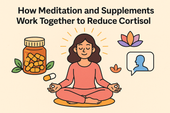
How Meditation and Supplements Work Together to Reduce Cortisol: A Complete Guide to Calming the Mind and Body
Meditation and supplements can work hand in hand to naturally reduce cortisol, your body’s main stress hormone. 🌿 Learn how mindfulness practices, adaptogenic herbs, and nutrient support like magnesium, omega-3s, and B vitamins create a powerful synergy for calm, focus, and emotional balance—backed by science and daily rituals that truly reset your stress response.
-
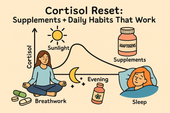
Cortisol Reset: Supplements + Daily Habits That Work
-

The Role of Adaptogens in Balancing Stress Hormones
Adaptogens work at the root of stress — your nervous system. 🌿 Learn how these powerful herbs help regulate cortisol, calm your nerves, and restore balance between energy and relaxation. ✨
-
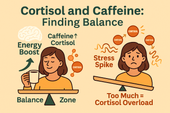
Cortisol and Caffeine: How Much Is Too Much?
Caffeine can boost energy and focus — but too much can overstimulate your stress hormones. ☕ Learn how caffeine affects cortisol, energy levels, and mood, and discover how to find the perfect balance for lasting calm and clarity. 🌿
-

Antioxidants for Stress Management and Cortisol Control
When stress overwhelms your body, antioxidants come to the rescue. 🌿 Learn how vitamin C, CoQ10, and other natural compounds help reduce oxidative stress, regulate cortisol, and restore calm energy from within. ✨
-

Cortisol and Gut Health: How Probiotics May Help
Chronic stress doesn’t just affect your mind — it changes your gut. 🌿 Learn how cortisol disrupts the microbiome and how probiotics can help restore balance, improve digestion, and calm your stress response naturally. ✨
-

Vitamin D and Cortisol: Supporting Immune Balance
Vitamin D does more than strengthen bones — it helps regulate cortisol and support immune balance. 🌞 Learn how this essential hormone-like nutrient restores calm, improves mood, and strengthens your body’s natural stress defenses. 🌿
-
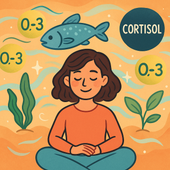
Omega-3s and Cortisol: Fighting Inflammation Naturally
Omega-3s are more than heart-healthy fats — they’re natural cortisol regulators. 🌿 Learn how EPA and DHA help reduce chronic inflammation, calm the nervous system, and support stress recovery from the inside out. ✨
-

High Cortisol and Belly Fat: Can Supplements Help?
Chronic stress can make belly fat harder to lose — but supplements like ashwagandha, magnesium, and omega-3s may help restore cortisol balance. 🌿 Learn how science-backed nutrients support fat metabolism, calm your stress response, and bring your body back into harmony. ✨
-
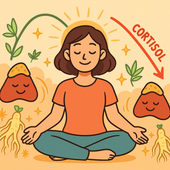
How Ginseng Can Support Energy and Cortisol Balance
Ginseng is one of nature’s most powerful adaptogens, helping your body handle stress without burning out. 🌿 Learn how this ancient root supports balanced cortisol, steady energy, and sharper focus — restoring vitality naturally and sustainably. ✨
-
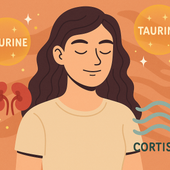
Taurine and Cortisol: Supporting Focus Under Stress
When cortisol surges, focus fades — but taurine helps restore balance. 🌿 Learn how this powerful amino acid calms your nervous system, regulates stress hormones, and sharpens concentration without jitters or fatigue. ✨
-
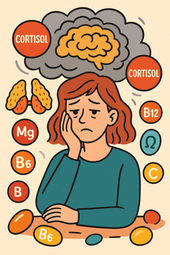
The Link Between Cortisol, Brain Fog, and Nutrient Deficiencies
When brain fog sets in, it’s not just in your head — it’s in your hormones. 🌿 Discover how cortisol imbalance and nutrient deficiencies like low magnesium, B vitamins, and omega-3s can cloud your focus and how restoring balance brings back mental clarity and calm. ✨
-
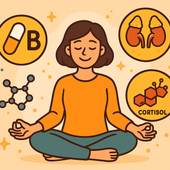
B Vitamins for Stress, Energy, and Cortisol Regulation
B vitamins are the foundation of stress resilience and steady energy. 🌿 Learn how this essential group of nutrients helps regulate cortisol, restore focus, and keep your nervous system calm — giving you balance from the inside out. ✨
-

Cortisol Imbalance and Chronic Fatigue: Can Supplements Help?
When chronic stress keeps cortisol high, fatigue and brain fog follow. 🌿 Learn how to rebalance your stress hormones naturally with calming nutrients, adaptogens, and lifestyle rituals that restore energy, focus, and inner peace. ✨
-

Adaptogen Stacks for Better Sleep and Lower Stress Hormones
Adaptogens can help your body recover from stress and sleep better by regulating key hormones like cortisol and adrenaline. 🌿 Learn how adaptogen stacks work to restore balance, calm the mind, and rebuild resilience — so you can rest deeply and wake renewed. ✨
-

Phosphatidylserine for Nighttime Cortisol Control
When stress hormones stay high at night, deep rest becomes impossible. 🌙 Discover how phosphatidylserine helps calm the brain, reduce nighttime cortisol, and restore healthy sleep rhythms — so you can wake up peaceful, clear, and recharged. ✨
-

Magnesium for Stress Relief and Cortisol Reduction
Magnesium is one of the most powerful natural tools for stress relief. 🌿 This essential mineral calms your nervous system, lowers cortisol, and helps your body recover from chronic tension. Learn how magnesium replenishes balance, improves sleep, and restores inner peace — naturally. ✨
-

Supplements to Improve Sleep by Balancing Cortisol
When cortisol stays high at night, sleep becomes a struggle. 🌙 Discover natural supplements that calm the nervous system, lower stress hormones, and restore your body’s natural rhythm. From magnesium and ashwagandha to L-theanine and phosphatidylserine, learn how to build deeper, more restorative rest. 🌿
-

Cortisol and Sleep: Why Stress Keeps You Awake
When stress keeps your body in fight-or-flight mode, cortisol refuses to calm down — and sleep becomes impossible. 🌙 Learn how elevated cortisol disrupts your circadian rhythm, suppresses melatonin, and turns restless nights into exhaustion. Discover how to restore balance and reclaim deep rest. ✨
-

L-Theanine for Cortisol Balance and Anxiety Relief
L-Theanine — the calming amino acid from green tea — helps quiet the mind and balance cortisol, the body’s key stress hormone. 🌿 Learn how it promotes calm focus, eases anxiety, and supports deep rest without sedation, backed by modern research and centuries of tradition. ✨
-

Rhodiola Rosea and Stress Resilience: A Natural Cortisol Regulator
Rhodiola rosea is one of nature’s most powerful tools for resilience. 🌿 This Arctic root helps balance cortisol, fight fatigue, and sharpen focus — keeping you calm yet energized even under stress. Discover the science behind Rhodiola’s adaptogenic power and how it helps your body thrive under pressure. ✨
-

Ashwagandha for Cortisol Balance: What the Science Says
Ashwagandha helps your body recover from chronic stress by calming the adrenal system and balancing cortisol — your key stress hormone. 🌿 Learn what science says about this powerful adaptogen, how it restores energy and focus, and why it’s one of nature’s most effective tools for modern stress relief. ✨
-

Supplements That Naturally Lower Cortisol Levels
When cortisol levels calm, your energy transforms — no more crashes or jitters, just steady focus and inner peace. 🌿 Learn which natural supplements and habits lower stress hormones, boost calm energy, and help your body thrive with balance instead of burnout. ✨
-

What Is Cortisol Imbalance? Symptoms You Shouldn’t Ignore
Cortisol — your body’s main stress hormone — keeps you alert and energized, but when it’s out of balance, it can drain your health. 🌿 Learn the signs of cortisol imbalance, from fatigue and anxiety to sleep disruption and stubborn weight gain, and discover how to restore calm, energy, and hormonal harmony naturally. ✨
-

The Best Daily Multivitamins for Menopausal Women
Menopause brings new nutritional needs that your old vitamin routine may no longer meet. 🌿 Discover how the right daily multivitamin can boost energy, balance mood, support bone and heart health, and keep your skin glowing. Learn which nutrients truly matter — from vitamin D to magnesium and B12 — to feel strong and vibrant every day. ✨
-

Antioxidants and Menopause: Fighting Inflammation Naturally
During menopause, oxidative stress and inflammation can quietly accelerate aging, fatigue, and skin changes. 🌿 Learn how antioxidants — from vitamins C and E to polyphenols in berries and green tea — help neutralize free radicals, reduce inflammation, and restore balance naturally. Discover the science of radiant, resilient aging. ✨
-

How CoQ10 Supports Heart Health After Menopause
After menopause, heart health becomes more important than ever. ❤️ Discover how CoQ10 — your body’s natural energy molecule — supports cardiovascular strength, restores vitality, and protects against oxidative stress. Learn how this essential nutrient helps keep your heart energized, balanced, and resilient through every stage of life. 🌿
-

Collagen Supplements for Skin and Joint Health Post-Menopause
After menopause, collagen loss affects both skin elasticity and joint comfort — but supplements can help rebuild from within. 🌸 Learn how collagen peptides, vitamin C, and other nutrients work together to restore firmness, reduce stiffness, and keep you glowing and mobile well into your next chapter. ✨
-

Calcium and Vitamin D: Protecting Bone Health in Menopause
Menopause brings hormonal changes that can weaken bones—but with the right nutrients, strength and stability can be rebuilt. 🦴 Learn how calcium and vitamin D work together to protect bone density, prevent fractures, and keep your body resilient. This guide explores nutrition, sunlight, and lifestyle habits that help your bones stay strong and vibrant for years to come. ☀️💪
-

Adaptogens for Energy and Resilience During Menopause
Feeling drained or emotionally scattered during menopause? 🌿 Discover how adaptogenic herbs like Ashwagandha, Rhodiola, and Ginseng can restore energy, balance cortisol, and build emotional resilience. Learn how these natural allies work with your body—not against it—to help you stay strong, focused, and calm through life’s hormonal changes. 🌸
-

Supplements That Help Beat Menopause Fatigue
Menopause fatigue can feel like more than tiredness—it’s a total energy crash. This guide explores how specific supplements, mindful breathwork, and therapy can help restore balance. Learn how nutrients like B vitamins, magnesium, and adaptogens rebuild your stamina, while breathwork and emotional healing calm your nervous system and bring vitality back to your days. 🌿✨
-

Herbal Blends for Menopausal Restlessness: Finding Calm in Transition
Herbal blends bring the wisdom of nature into moments of rest and renewal. Discover how soothing herbs like chamomile, lemon balm, and ashwagandha work together to calm menopausal restlessness, balance hormones, and invite deep relaxation. 🌿💫
-

Magnesium + Glycine for Deep Sleep During Menopause
Nutrients like magnesium, glycine, and B vitamins form the foundation for deep, restorative sleep during menopause. Discover how these natural compounds calm your nervous system, balance hormones, and help you wake up refreshed and recharged. 🌿💤
-

Melatonin and Menopause: Restoring Your Sleep Cycle
Nutrients are the foundation of hormone balance and energy. Learn how vitamins, minerals, and whole foods like greens, salmon, and berries nourish women’s bodies during menopause and beyond — restoring vitality, mood, and strength. 🌿🥗
-

How L-Theanine Helps With Menopausal Anxiety
Science continually deepens our understanding of the human body, from hormones to neurotransmitters. Discover how evidence-based research shapes modern wellness — bridging natural medicine, neuroscience, and hormone balance for healthier living. 🔬🌿
-

Can Ginkgo Biloba Improve Memory in Menopausal Women?
Hormone therapy can be a powerful tool for easing menopause symptoms and restoring balance. Learn how it works, the types available, and how to combine it safely with lifestyle and natural support for optimal well-being. 🌸💊
-

B Vitamins for Mental Clarity During Menopause
Nutrients are the foundation of mental and physical balance during menopause. Discover how vitamins, minerals, and whole foods like leafy greens, fish, nuts, and citrus can fuel energy, clarity, and calm while supporting hormonal health. 🌿✨
-

Mood Swings and Menopause: Natural Nutrient Support
Probiotics do more than support digestion — they help balance mood, hormones, and immunity too. Learn how a healthy gut microbiome can ease menopause symptoms, boost energy, and improve emotional resilience naturally. 🌿🦠
-

Brain Fog in Menopause: Supplements That May Help
Supplements can be powerful allies in restoring balance, energy, and focus—especially during menopause. Learn how nutrients like omega-3s, vitamin D, magnesium, and herbal adaptogens work together to support brain health, reduce stress, and promote lasting vitality. 🌿💊
-

Adaptogen Stacks for Reducing Night Sweats
Hormone detox isn’t about cleansing your body—it’s about restoring flow. Learn how the liver, gut, and endocrine systems work together to eliminate hormone buildup and how herbs like milk thistle, dandelion, and schisandra support balance, clarity, and natural vitality. 🌿💫
-

Cooling Menopause Symptoms with Herbal Support
Ashwagandha is one of nature’s most powerful adaptogens, helping women manage stress, sleep better, and balance hormones naturally. Discover how this ancient root supports calm energy, emotional resilience, and relief from menopause-related anxiety and fatigue. 🌿💫
-

Evening Primrose Oil and Menopause: What the Research Says
Hot flashes are one of the most common—and frustrating—symptoms of menopause. Discover what causes them, why the body’s “internal thermostat” becomes unbalanced, and the natural supplements and lifestyle shifts that can help you cool down, rest better, and feel more in control. 🔥💧
-

How Black Cohosh Helps with Menopausal Symptoms
Sleep disturbances are among the most exhausting symptoms of menopause—but they don’t have to rule your nights. Discover how natural strategies and calming supplements can help you fall asleep faster, stay asleep longer, and wake up feeling truly restored. 🌙💤
-

Natural Supplements That May Reduce Hot Flashes
Hot flashes can disrupt sleep, confidence, and daily comfort—but natural relief is possible. Discover the best research-backed supplements like black cohosh, red clover, and licorice root that may reduce hot flashes, balance hormones, and restore inner calm during menopause. 🌿💫
-

Omega-3s and Menopause: Supporting Mood and Inflammation
Omega-3 fatty acids are essential for hormonal harmony, brain function, and emotional balance—especially during menopause. Learn how these healthy fats reduce inflammation, support heart health, and restore calm, vitality, and focus through every stage of midlife. 🌊💫
-

The Role of Vitamin D in Menopausal Health
Vitamin D plays a powerful role in menopausal health—supporting bone strength, hormone balance, and mood stability. Discover how optimizing your vitamin D levels can improve sleep, energy, and emotional well-being while protecting long-term vitality through every stage of menopause. 🌞💪
-

Magnesium for Menopause: Relaxation, Sleep, and Hormonal Support
Self-regulation is the art of staying calm, centered, and in control—no matter what life throws your way. Learn how to strengthen emotional balance, manage stress responses, and cultivate inner peace through mindful techniques that reconnect your heart, body, and brain. 🌿💫
-

Can Adaptogens Like Ashwagandha Ease Menopausal Symptoms?
Brain fog during menopause can make even simple tasks feel overwhelming—but you’re not losing your sharpness, your hormones are simply shifting. Discover how adaptogens like ashwagandha and key nutrients can restore mental clarity, balance cortisol, and bring calm focus back to your day. 🌿🧠
-

Supplements That Support Hormonal Balance During Menopause
Herbal supplements have supported women’s health for centuries—and modern science is finally catching up. From ashwagandha and maca to red clover and rhodiola, discover how nature’s most trusted herbs can calm stress, balance hormones, and enhance energy through every life stage. 🌿✨
-

The Ultimate Motivation Stack: Supplements That Work Together
Discover how therapy helps restore motivation, focus, and emotional balance alongside supplement and mindset strategies. This empowering article explores how addressing thought patterns and emotional blocks through therapy can complement biochemical tools for long-term drive and well-being. 🧠💬


















































